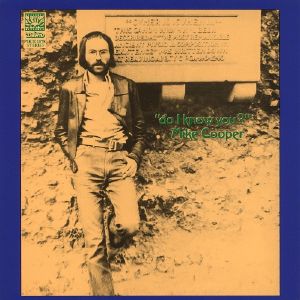
- Format: MP3

Size: 111 MB
Bitrate: 256
mp3
Ripped by: ChrisGoesRock
Artwork Incuded
Source: Japan 24-Bit Remaster
Guitarist Mike Cooper is as responsible as anyone else — and more so than many — for ushering in the blues boom in the U.K. in the late '60s. His use of a '20s National Steel didn't hurt, but neither did his knowledge of the techniques of Fred McDowell and Blind Boy Fuller; or his rock-solid songwriting in both the folk and blues genres. His debut, recorded on the Pye label in 1969, was a largely forgettable affair due to dodgy production, but it was auspicious enough to land him a deal with Dawn Records, for whom he recorded four astonishing records between 1970 -1973, the first of which is Do I Know You?. On his debut for Dawn, Cooper hybridized his use of the blues in his songs. The opener, "The Link," and Journey to the East," are open, modal pieces, which use open tunings and drones produced by a 12-string tuned in open-A.
They are wide-open country romps — meaning the English countryside, not Nash Vegas — and full of a driving power and fluency with the traditional languages to make them both breezy and muscular. It isn't until "Theme in C" that Cooper's legendary slide playing makes an appearance. Using his National Steel and some weird sound effect, he begins with a near-Travis-style picking technique, followed by Fred McDowell's high-end, slip-and-slide method of vibrato, always returning to an open-E to end the phrase. Again, Cooper's style is trademarked by the ease with which he attacks the instrument, and makes his playing sound like water running over rocks.
It's hum-able, percussive, and full of shimmering glissando as well. On his vocal tunes, such as "First Song" and "Thinking Black," it's the blues tunes; with their thin, reedy, vocal qualities, that work best,. But even here there are exceptions to that rule. The closing track, "Looking Back," is a folk song underlying a gorgeous, soul-music feeling that is enhanced by the use of an upright bass played by Harry Miller. In the mournful, drifter tradition, Cooper traces the same lyrical territory his good friend Mike Chapman had mined a year before with '"Rainmaker," but his voice is lighter, freer, less-weighted by the mournful, bitter edge that was Chapman's trademark; and therefore more palatable, if not believable. As an album, Do I Know You? proves that Cooper was a major talent, who, if given the chance, would have had staying power due to his musical restlessness; and it provided a mere hint of the things to come on the legendary Trout Steel a year later.
This was Cooper's second full-length solo album, released in 1970 on Pye/Dawn Records, following the previous year's Oh Really?!? Born in 1942, Cooper started his solo recording career relatively late; he was already 27 when his debut was released, and the benefits of time are clearly shown -- none of the hesitancy of youth, found on the debut records of so many other (younger) folkies of the time, finds its way onto his recordings.
It helps, of course, that he'd been cutting his teeth since 1958. He founded an R&B band called the The Blues Committee in '62, which opened for such blues legends as John Lee Hooker, Jimmy Reed, and Howling Wolf when these greats played in Cooper's home town of Reading (UK).
Concomitant to his blues playing, however, he was performing folk and country blues as a solo artist, and cut his first single in '66 w/ singer/guitarist Derek Hall (whose whereabouts are apparently now unknown).
The combination of these traditions -- (country) blues and folk -- informed his earlier work, and is what can be found here on Do I Know You? This is an outstanding document of a tremendous talent, rendered with little other than acoustic guitar and his distinct voice.
Despite his being British, the traditional English folk heritage evident in the music of other outstanding British pickers/singers (cf. the Village Thing roster) doesn't crop up much in Cooper's recorded legacy; he's long seemed to valorize the American folk heritage over the English.
In his later work, Cooper became more interested in avant-garde and free jazz/improv idioms, yet his roots never truly shriveled up, and can be heard in his work even today.
01. Link Mike Cooper
02. Journey to the East Mike Cooper
03. First Song Mike Cooper
04. Theme in C Mike Cooper
05. Thinking Back Mike Cooper
06. Think She Knows Me Now Mike Cooper
07. Too Late Now Mike Cooper
08. Wish She Was with Me Mike Cooper
09. Do I Know You? Mike Cooper
10. Start of a Journey Mike Cooper
11. Looking Back Mike Cooper
Bonus Tracks
12. Your Lovely Ways Pt.1&2 Mike Cooper
13. Watching You Fall Pt.1&2 Mike Cooper